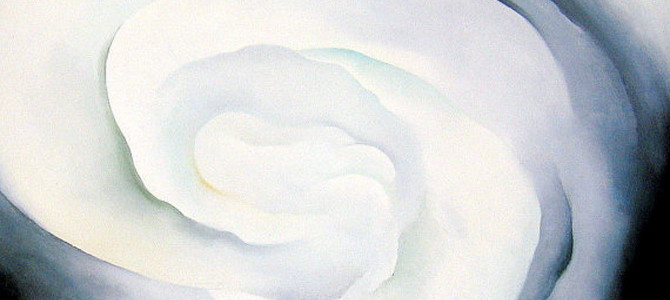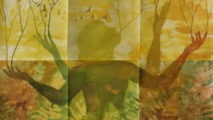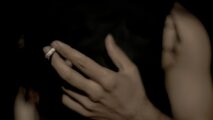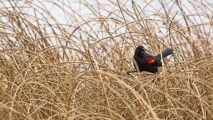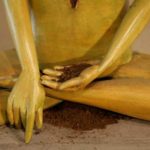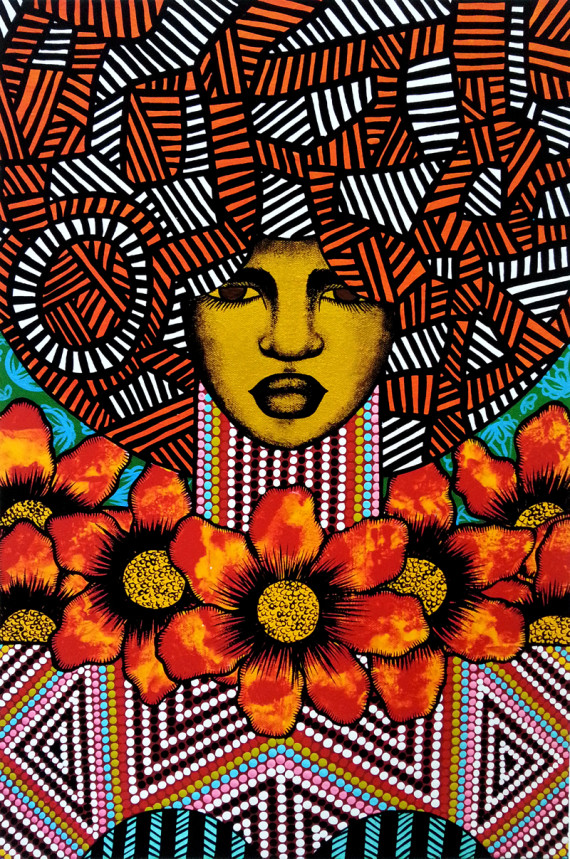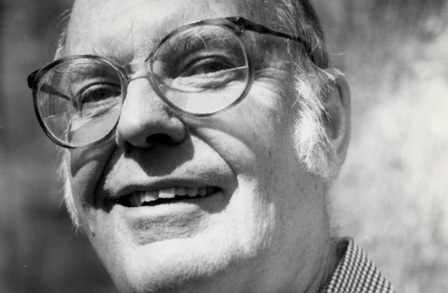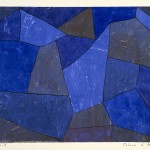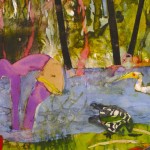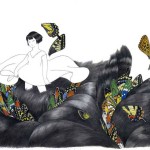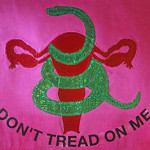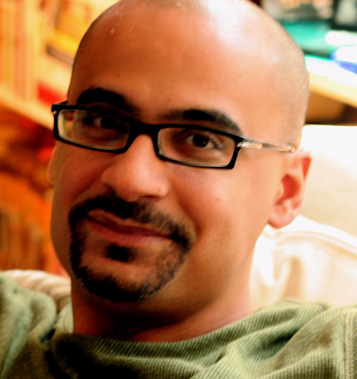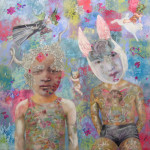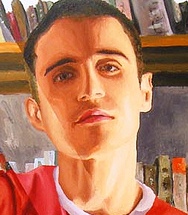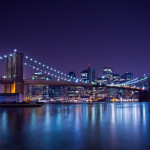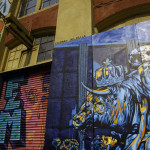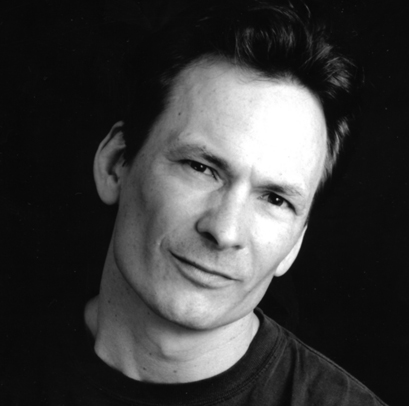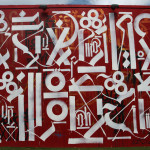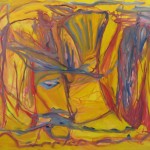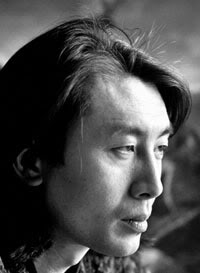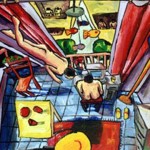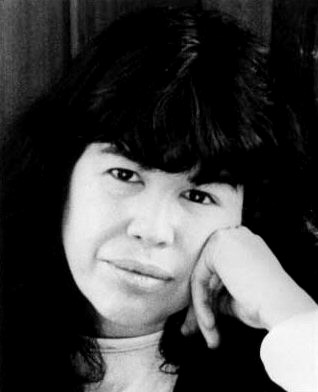First I pay a visit to Saint Rita to place a white rose at her feet. The rose is a tightly closed bud wrapped in tissue paper, with a tube of water at the end of its stem to keep it fresh. Although St. Rita is slightly out of the way, I make a special trip. I take the train from Worcester to Boston, get off at South Station, take the bus to Hanover Street, and walk along the crowded sidewalk with backpacked students and paisanos–men who stand in front of stores wearing opened shirts and calling out to people they know across the street. There are old women wearing floral house dresses and curlers hanging out brick building windows, middle-aged women cupping cigarettes, talking about the men. There are parked cars, double parked cars, delivery trucks, cab drivers waving their hands, old men with small frothy cappuccino cups whose eyes follow the smooth rumps of heeled women. I know I am related to some of them; some of them have gone to the funeral of my grandfather. I move quickly, not to be noticed.
St. Leonard’s Church has a courtyard with roses and statues including the Lady of Fatima and the three child seers, Lucia, Francisco, and Jacinta. The children are white, spattered in sunlight and kneel at the shaded Virgin’s feet looking up at her; their hands are folded beneath their chins in prayer. My grandmother said that Jacinta’s body was repeatedly dug up and her face was incorrupt, meaning it had not decomposed. My sister and I are constantly reminded that we look like Lucia and Jacinta, the oldest and the youngest. If we had a brother, he would be Francisco. This made me uneasy yet honored to be compared to a girl who would become a nun, who used to wear a rope around her waist to cause herself pain, and who refused water to the point of dehydration to save sinners.
I ascend the steps into the church, into a dark coolness, a quietude. Old, stocky Italian women with black kerchiefs over their heads kneel with rosaries in their hands. Their eyes are closed and their faces are solemn, yet strained; they are asking for something. People putter about, lighting red electric candles for the dead. No one speaks.
I remember being here dressed in a blue woolen coat with matching hat, white stockings, and shoes with a brass buckle, how the wood of the pew came up to my mouth, how I could smell the resins in the wood while staring into the coats of the people in front of me. I sat quietly, as best as I could; I did what everyone else did. I breathed in the smoky-sweet incense coming from a gold urn-like vessel dangling from a chain in the priest’s hand. Frankincense and myrrh, I thought of kings. Afterward, water was tossed onto the people’s heads with a gold scepter. I repeated what my grandfather did, crossed myself even though the drops had missed me.
I dip my hand in the holy water at the door. I get a little too much of it, and it runs down my temples like sweat.
I find the statue of St. Rita with the crucifix in her hands, kneel before her and place a white rose at her feet. I notice there is a chip of paint missing from the foot, exposing white stone. When no one is looking, I run my finger along her black veil as I used to when my grandfather held me in his arms. I look up to St. Rita’s painted-on face. She looks a little bit like a mannequin in a nun’s habit, with Barbie-colored skin and baby doll eyes. They should have left her white, like Lady of Fatima in the garden, ethereal. A mystery. I get up, walk to the door, cross myself with holy water, follow a pack of people out, and continue to push toward Stephen, hoping I will not run into any of Zia Mariuche’s children who might slow me down.
Stephen and I sit on the floor of the dorm room. There is a strange green glass mechanism on the desk that looks phallic, as well as a hot plate, boxes of Oodles of Noodles, and goldfish crackers, some of which are crushed into the carpet. A lava lamp with blue floating orbs is next to the strange green glass mechanism. The walls are decorated with a poster of the Beatles during their later years when they looked like the Apostles and one from the movie Dune with two blue planets in a pink and black sky above a gray sand dune with knife-like shadows. There are two twin beds in the room, one made, the other unmade, with sheets twisting off the mattress onto the floor. Stephen’s drums are set up in an enclave that includes a bay window. The room smells like tea.
Stephen sits on a stool with a mandolin in his lap, plucking at the strings. He is trying to debug the instrument, experimenting with notes to find harmony. There is a bongo next to him; the drumhead is the skin of something stretched and bleached by the sun. He taps his foot on the floor to keep time.
I sit on the made bed, pick up a sketchpad and open it. The pad is filled with abstract drawings, sketches of planets, Jupiter with the big red eye, Saturn with her delicate icy rings. There are numbers written in ratios 2:3, 3:4, calculations in miles per hour. Some of the drawings have no shapes, only colors in small black frames. There are six frames to a page. The colors seem to ripple in waves within each of the frames. On another page there is a diagram of a blue heron in colored pencil, the shades of the feathers different hues of blue and gray.
I find a clean page, grab a pencil, and begin to draw Stephen. I am relaxed; the art is more play than anything else, a sort of tinkering, like Stephen’s plucking of the mandolin. I make a continuous line drawing, a technique we studied in art class; you don’t think, you don’t pick up the pencil, you keep moving. The line travels around Stephen’s engineer’s cap, down the fringe of his hair, down his arm, the curve of the mandolin, the neck. His fingers are whimsical loops, his big toe larger than it need be. The line is like a string; if you pull at it, the composition would unravel like yarn from a sweater.
Stephen gets up, puts the mandolin aside, and sits next to me. He runs his finger along the pleats of my flowered skirt. I feel an iron spike of sensation through the core of me, as if I am impaled on a spit. I ask him what the strange glass green mechanism is.
He chuckles. “That’s a bong, shhhweethaardt.”
“What’s it for?”
“Are you for real? Bongs are for weed. Weed is to get you high, to relax you, to get you to go to another room in your head.” He says the mind is filled with rooms, and the one pot opens is one of curiosity and contemplation. I think of how the body is a temple, and you shouldn’t poison it, how people who smoke pot are weak, as my father says. Stephen is a druggie. A pothead. A burn out, like Eve Simeone. Stephen puts the bong away in a drawer where we cannot see it. He faces me.
“It’s a cleaner way of ingesting it,” he says. “Better than smoking, if that means anything.”
I’m not convinced. I stand up and go to look out the window and see a black man with a cigarette in his hand, talking to himself. His pants are army green, full of holes and filthy. He smokes pot. A woman in a dress suit strides by, exuding confidence. She doesn’t.
“Don’t shut me out, Jackie,” he says.
“But I don’t know who you are,” I say. What I want to say is, I don’t know if you are safe.
“Yes, you do. You know who I am, Jackie. Don’t let all your programming distort the issue. It’s just pot. I don’t do heroin. I’m not ever going to do heroin.”
“What do you mean programming,” I say.
“Look, you were brought up a certain way, and I respect that. I even honor it on some level, because you are pure and innocent, and that is very appealing to me. But I am different.”
He moves toward me. I put my hand on the cool glass. He stands behind me and rearranges my hair so that it falls down the back of me. “You know, I thought I saw you a couple of times. In a train station. A cafe. I composed ‘Dragonfly Dirge’ and sent it to you then. I wasn’t sure whether you would get it or not.”
“I get it,” I say. He looks at me, runs his fingers down the length of my arm. The iron spike throbs.
“Do you?” he asks.
We take the Green Line to Huntington Street to the Museum of Fine Arts. Stephen and I blend in with all the other kids, straight-haired Asian girls in miniskirts and flip flops, boys in Red Sox baseball caps, striped t-shirts and jeans, a cloud of Chaps emitting from their pores. Men in business suits hold newspapers and steady themselves with a free hand as the T jolts and halts along. Stephen is holding onto me around the waist while his other hand grips the bar above our heads. Our bodies shift with the train, continue moving when it comes abruptly to a stop. People step on each other’s toes, apologize softly, go back to doing what they were doing. I study Stephen’s t-shirt because it is a place to put my eyes, to not focus on the pinpoint of the iron spike. There are monsters on his shirt, kiddie-friendly monsters in reds, yellows, and greens. The monsters look like mushrooms or Stonehenge with eyes. Above the monsters is the name Meat Puppets, the name of a band. I’m not exactly sure what a meat puppet is, but if I had to guess, I think it would be a penis.
Stephen has two free passes, so we get to move to the head of the line. We get buttons to put on our shirts that say MFA on them. The large foyer is cool and light-filled. We ramble through the rooms, but I am distracted. This is sensory overload, a feast for the eyes when the body is already on fire. We view the daughters of Edward Darley Boit in their white pinafores, Gaugin’s yellow-bodied natives and serpentine trees, Monet’s pacifying water lilies. A girl with a piece of cardboard with a square cut out holds it up to a painting. She is drawing what she sees in the square, focusing on the Boit daughter standing with her hands behind her back. The study is in line and shade only; she completes the hair on the girl’s head. I remember using a view finder myself in art class, aligning it with certain points on the painting to get the same picture in the hole every time you look through it. It is a technique to get you to focus and forget about everything else.
We huddle before a painting of several silver plates with shucked oysters and a half-peeled lemon, a toppled chalice, a nut that looks like a brain, a sardine with the head chewed off, broken glass, the delicate creases of falling cloth. Stephen traces his finger in the air above the jagged edges of the broken glass.
“Sir,” the docent says, “Please do not get so close.”
Stephen nods his head to the docent and steps back. I am embarrassed for him, but he shrugs it off. He tells me the broken glass is the best part of the painting.
We peruse Egyptian relics, the artifacts of tombs, long-necked lutes, traditional Egyptian fiddles. We grow weary, walk out to an ivy-covered courtyard for some air, and make out until people file into the courtyard and propriety forces us to quit. We enter the museum once again, flushed, complete our trip with Picasso, his portrait of a woman in divided shapes. But this is not what impresses me. I return several times to view O’Keefe’s white rose, the same white rose I brought to St. Rita, only now it is among the blue soul of larkspur and caught in a celebratory unfolding, a perfect bloom.
We walk through Boston Commons where brazen squirrels dart at our feet, and nameless people lie in the shade covered with blankets. The heat of the day has crested, and the air is becoming cooler; the blanketed bodies prepare for night. We pass a body close to the walkway, and Stephen unfolds a dollar and tucks it inside the blanket. Starlings and pigeons fight for food remnants at the bottom of a garbage receptacle nearby. The tinny music of a metal guitar (dobro, Stephen calls it) fades as we walk under the shade trees and come to a man in dreadlocks sitting under a tree near the walkway. His legs are crossed, and he is observing passersby with a dreamy gaze; he smells of sandalwood and vomit.
Stephen whispers in my ear, “He’s a heroin addict.”
I look back at the man; he twitches a moment, then returns to his gazing. “How do you know?”
“I sat down with him for a while the other day. Asked him how he was doing. I noticed him here yesterday in the same place. He’s been sitting there for almost twenty-four hours straight.”
“Why do you think he’s a heroin addict?”
Stephen gives me a look, Come on. “He told me he could see the water droplets in the morning haze, could feel them on the tip of his tongue. Said they tasted like sugar crystals. Then he opened up his mouth to eat some of them and I split. Junkies are known to projectile vomit from out of nowhere.”
I look back at the cross-legged man. He sways a little now, like he hears music coming from another world.
We walk to the Boston Public Gardens where tourists ride in boats with fake swans in a manmade pond, where peach-colored roses are kept in well-manicured beds, and people walk to and fro, lighthearted, the workday done. Ducks mingle at the water’s edge, tilting their butts in the air to reach something underneath. Two swans grace the tourists with a photo op, and willows delicately sweep the ground. Stephen and I sit in the sun to dry off; he falls asleep with his head on my lap.
I think of the word “programming,” how I dismissed it so easily. Programming refers to robots, to computers, to things that process commands and carry them out without asking questions. I think of the female robots that fought the Bionic Woman. Fembots. Programmed women. They were terrifying, not only because of their strength and their ability to throw Jamie Sommers across the room, but because they were simplified.
We have pizza, then hurry back to his dorm room. We know why we have come here: our bodies need resolution. Stephen asks me if I want to play the drums. He tells me to sit on his lap and places my hands on his wrists moving them with his motions, with his rhythm. We go from snare to cymbal to his top toms over and over again. I close my eyes, feeling this motion around me. He’s got his legs around me, and I can feel him become hard. He grabs the cymbals to stop them from shimmering and lays me down on the floor. We continue to search for the beat, the rhythm inside us. My legs turn numb. He moves downward to the center of me, lifts my skirt, takes down my underwear, finds the place where sensation begins. My grandfather appears in my head, dead and omniscient; he can see everything. I squeeze my eyes harder, and he disappears into the black. There are other thoughts I must combat, the baby doll eye of the Saint. The incorrupt face of
Jacinta.
At four o’clock, sensation blooms in the center of me like O’Keefe’s white rose; the petals part to expose a beating heart. Stephen observes me, and I grasp on to his shoulders. I feel the ecstasy of the heroin addict. Stephen smiles; I have done something good.
I miss my train.
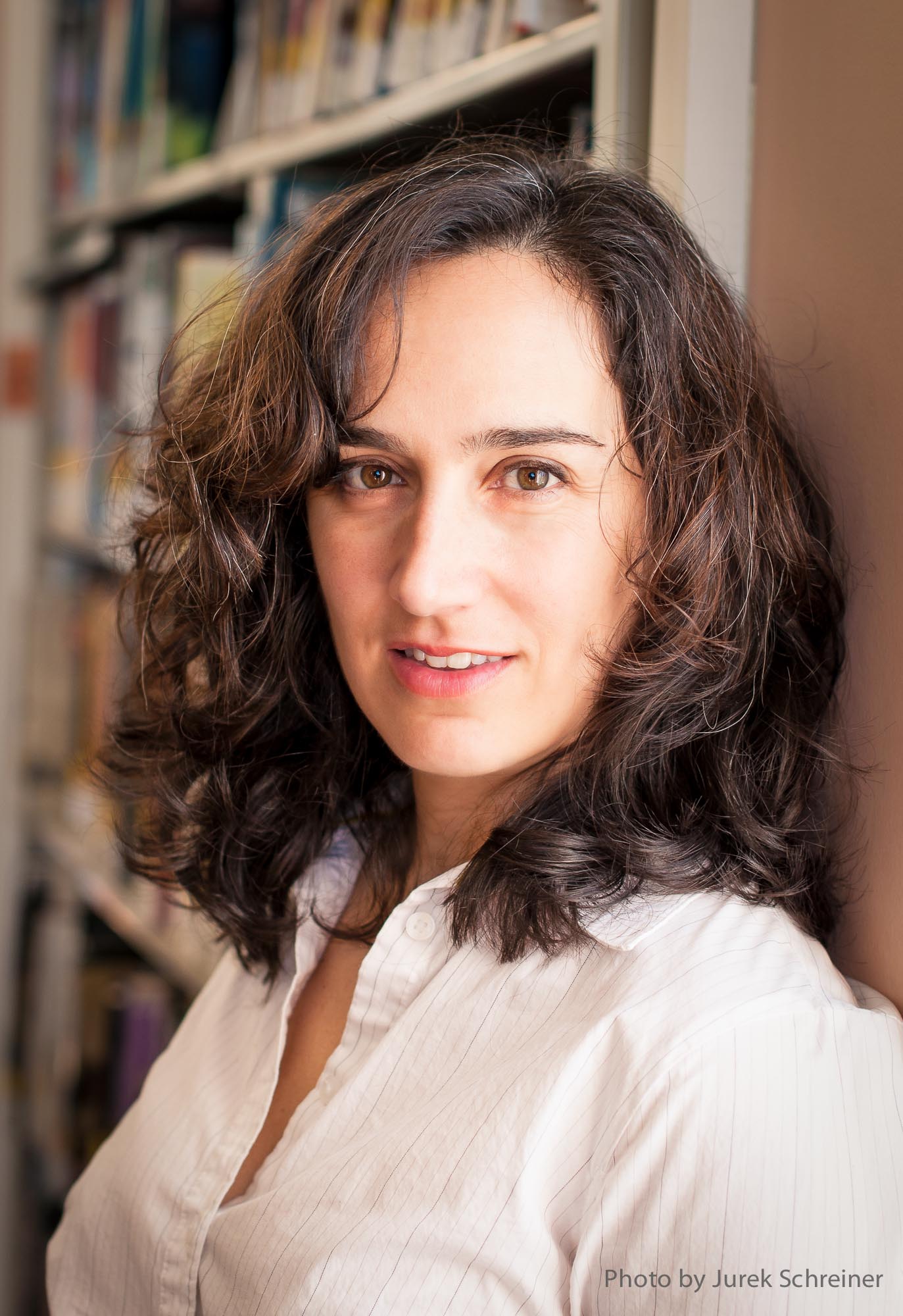 Laurette Folk’s debut novel, A Portal to Vibrancy (Big Table Publishing, 2014) is available online and at local bookstores. Ms. Folk has been published in Upstreet, Literary Mama, The Boston Globe Magazine, elephant journal and Talking Writing among others. She writes the blog “Meditations and Reflections at www.meditationblog.blogspot.com and is the editor and founder of The Compassion Project: An Anthology. For more information, please see her website at www.laurettefolk.com.
Laurette Folk’s debut novel, A Portal to Vibrancy (Big Table Publishing, 2014) is available online and at local bookstores. Ms. Folk has been published in Upstreet, Literary Mama, The Boston Globe Magazine, elephant journal and Talking Writing among others. She writes the blog “Meditations and Reflections at www.meditationblog.blogspot.com and is the editor and founder of The Compassion Project: An Anthology. For more information, please see her website at www.laurettefolk.com.
Related Posts
« Our Butterfly Does Not Fit In — Irene Mitchell SOMETHING STOLEN — Chris Campanioni »
